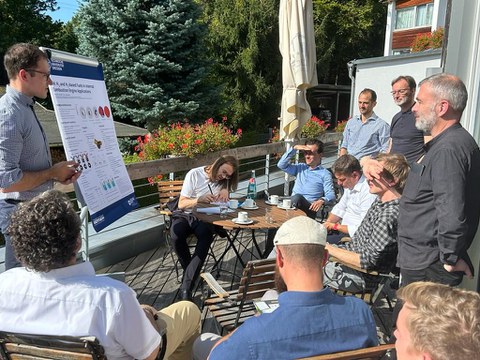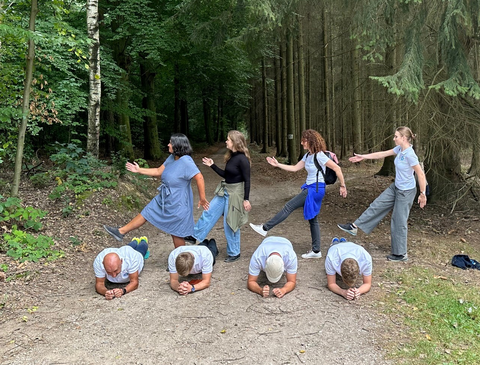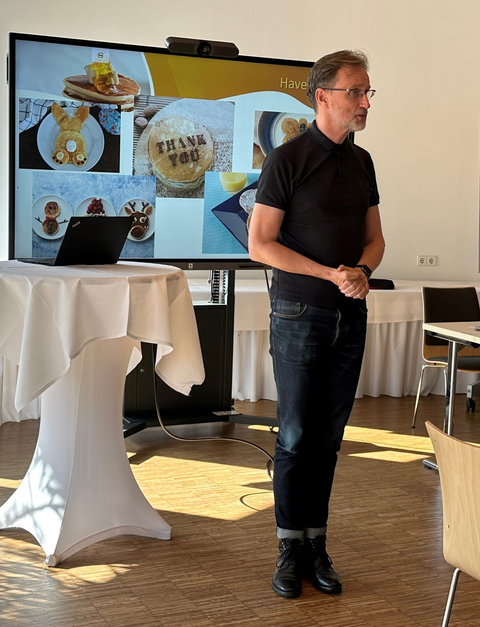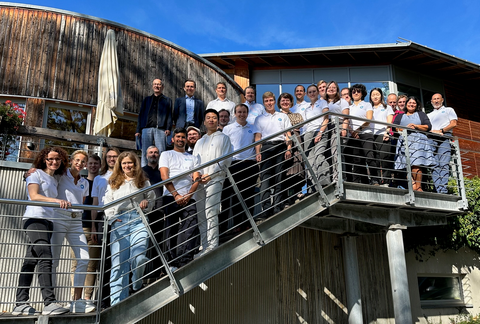Sep 29, 2023
Successful autumn colloquium 2023
The fourth generation of the Boysen-TU Dresden Research Training Group can look back on a successful autumn colloquium. The two-day event, which took place on September 25 and 26, 2023 at a conference hotel in Grüna near Chemnitz, brought together a lively community of researchers and promoted the exchange of knowledge and collaboration. But team-building activities in the beautiful rural surroundings of the venue were also an integral part of the packed agenda.
The colloquium began with a warm welcome and introduction by RTG spokespersons Prof. Dr. Antonio Hurtado and Prof. Dr. Lutz Hagen, who set the tone for an exciting event. Dr. Anna Martius, Managing Director of the Boysen-TU Dresden Research Training Group, gave an overview of the format and objectives of the autumn colloquium. Prof. Wijnand Veeneman from TU Delft was happy to accept the RTG's invitation to accompany the event as a "critical reviewer" for the research presented by the doctoral students. His contribution was very valuable for the discussions after the poster presentations. In addition, following the colloquium, doctoral students had the opportunity to consult directly with Prof. Veeneman on their respective projects.

Doctoral student Konstantin Schmidt at his poster presentation.
After the round of introductions, the main part of the colloquium began - the presentations. For the first time, the doctoral students presented the current status of their projects to the PIs and peers in a "Knowledge Café" format with poster presentations taking place in parallel. A "Knowledge Café" is intended to promote the exchange of knowledge and collaborative discussion among participants from different disciplines. Open dialog, reflection and the exchange of ideas in a relaxed atmosphere as well as a culture of continuous learning and innovation are supported by this format. The "WissensCafé" followed a fixed schedule: Small groups of 6-8 people, consisting of PIs and other Kollegiat:innen, came together at several themed tables for a 10-minute poster presentation. This was followed by another 10 minutes or so for discussion, questions and expert input before the small group moved on to the next topic table with a new poster presentation. The presenter remained seated and welcomed the next audience members. This gave each presenter the opportunity to adapt their presentation based on the immediate feedback afterwards if necessary and to apply and incorporate suggestions for consolidation or improvement directly in the next presentation. This special form of project presentation also allowed for a very lively discussion of the research project in small teams, ensured a lively and varied atmosphere, also due to the occasional "mixing" of the small groups, and generated positive feedback overall, both from the presenters and from the audience. On day 1 of the autumn colloquium, the doctoral students from clusters E and F were able to reflect on their projects in this way. At the end of the first day of the event, the presenters shared their feedback and gave valuable insights into the format and their experiences.
"We were able to present our posters four times each in the Knowledge Café today. Each of the poster rounds had its own character, as we were able to adapt the rounds individually to the current poster guests and had very different discussion rounds afterwards. I think it's great that you can present and discuss a poster in so many different ways." (doctoral student Markus Leyser, SP E5)

Treasure hunt task: recreate a famous picture or painting! - Who can guess it?
In addition to professional input and interdisciplinary exchange, joint activities in a relaxed environment were an equally important aspect of the two-day colloquium, especially in order to allow the still quite "young" 4th Boysen TUD Research Training Group to grow together better as a unit and to promote the team spirit that is typical and important for the RTG. On the first day, a treasure hunt organized by several students led two competing teams through the adjacent Rabenstein Forest. At various stations, the participants were challenged to answer very different questions as quickly as possible and with as few failed attempts as possible using several possible answers or to complete special tasks as a team. The winning team's treasure, a handful of colorful chocolate pearls, was presented in test tubes in proper style....
Day 2 of the autumn colloquium brought fresh energy and a focus on new clusters. Cluster G, together with a doctoral student from Cluster H and an associated project, presented their research posters, also in the form of a "Knowledge Café". This was followed in the afternoon by the research presentations of three female doctoral students who recently joined the Research Training Group in the dynamic Pecha Kucha format, which already proved its worth at the last spring colloquium. Each of the three fellows gave a short presentation about themselves and their project and there was room for questions and comments afterwards.
Instead of an outdoor activity, there was an amusing PowerPoint karaoke on the second day, in which the (voluntary) participants presented slides without any prior knowledge. Laughter and learning ensued as the researchers moved into unfamiliar territory.

Prof Veeneman (TU Delft) took up the challenge of PowerPoint karaoke
"These eventful two days brought the doctoral students, their topics and the PIs closer together. The format facilitated a direct exchange and a deeper understanding of the goals and challenges of each individual project." (doctoral student Stefan Röher, SP G2)
The Autumn Colloquium 2023 ended on a high note, with the doctoral students and PIs providing feedback on the format and making suggestions for future events. This reflective session emphasized the commitment to continuous improvement and collaboration within the Boysen-TU Dresden Research Training Group community. The colloquium not only provided a platform for knowledge exchange, but also strengthened the bonds between the doctoral students and PIs. It was evidence of the spirit of innovation, curiosity and camaraderie that thrives in the research group. While the fellows left with new insights and connections, the Boysen-TU Dresden Research Training Group looks forward to future events that will further enrich its research journey.

